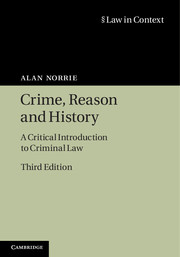Book contents
- Frontmatter
- Dedication
- Contents
- Preface to the third edition
- Preface to the second edition
- Preface to the first edition
- Table of cases
- Table of statutes
- Prologue: A brief history of the ancient juridical city of Fictionopolis
- Part I Context
- Part II Mens rea
- Part III Actus reus
- Part IV Defences
- 8 Necessity and duress
- 9 Insanity and diminished responsibility
- 10 Self-defence
- 11 Loss of control
- Part V Concluding
- Bibliography
- Index
10 - Self-defence
Published online by Cambridge University Press: 05 October 2014
- Frontmatter
- Dedication
- Contents
- Preface to the third edition
- Preface to the second edition
- Preface to the first edition
- Table of cases
- Table of statutes
- Prologue: A brief history of the ancient juridical city of Fictionopolis
- Part I Context
- Part II Mens rea
- Part III Actus reus
- Part IV Defences
- 8 Necessity and duress
- 9 Insanity and diminished responsibility
- 10 Self-defence
- 11 Loss of control
- Part V Concluding
- Bibliography
- Index
Summary
The principle of maximum certainty is not followed in the English law of justifiable force.
(Ashworth, 2006, 139)The point of relating these specific doctrinal disputes to underlying theories of self-defence is to demonstrate that issues such as the duty to retreat are but the revealed signs of deeper ideological clashes … then at least we understand why our principles are unstable and subject to unending debate.
(Fletcher, 1978, 874)The Irish view is that someone has been held accountable for killing two teenagers whose offence of travelling in a stolen car did not warrant the death penalty. Large sections of middle England, by contrast, view Pte Clegg’s life sentence as an undeservedly harsh fate for a soldier doing a difficult job in dangerous circumstances.
(McKittrick, 1995)Introduction
Self-defence is one of the oldest legal categories, and one of the most problematic. It covers a variety of situations, including defence of self, defence of others with whom one either has or does not have a close connection, defence of property, and prevention of crime. In its first three aspects, self-defence is covered by the common law, as recently partly restated by the Criminal Justice and Immigration Act 2008, s 76. In the fourth, the law is expressed in the Criminal Law Act 1967, s 3, which states that ‘A person may use such force as is reasonable in the circumstances in the prevention of crime or … lawful arrest.’ Since most acts of self-defence will also involve the prevention of a crime (for example, the assault that is defended against), there is significant overlap between self-defence, its ancillary forms and prevention of crime. They are usually discussed together. Covering a wide range of settings is one obvious reason for a broad and highly flexible law, as in the following statement:
[Self-defence] involves no abstruse legal thought. It requires no set words by way of explanation. No formula need be employed in reference to it. Only common sense is needed for its understanding. It is both good law and common sense that a man who is attacked may defend himself. It is both good law and common sense that he may do, but may only do, what is reasonably necessary. But everything will depend on the particular facts and circumstances. Of these a jury can decide.
(Lord Morris, Palmer (1971) at 832)- Type
- Chapter
- Information
- Crime, Reason and HistoryA Critical Introduction to Criminal Law, pp. 274 - 303Publisher: Cambridge University PressPrint publication year: 2014



